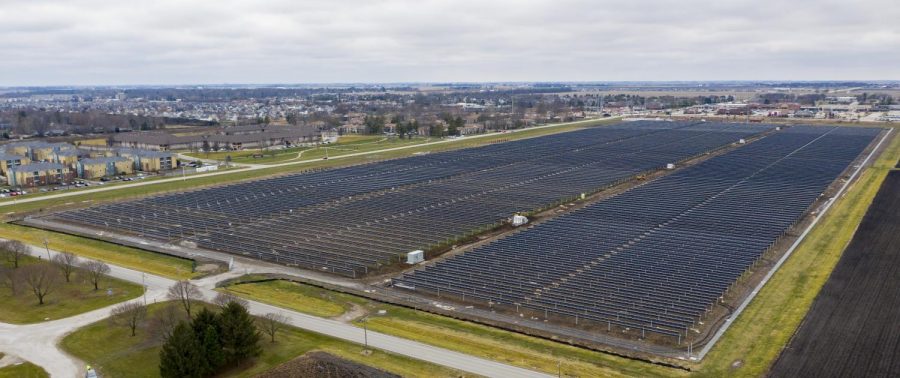University begins final stage of completing sustainable solar farm
Photo Courtesy of the University of Illinois
The University of Illinois Solar Farm 2.0 sits at the corner of First Street and Curtis Road on an overcast day. The Solar Farm is in its final stages of completion.
May 25, 2021
Last updated on May 27, 2021 at 09:47 p.m.
The University is commencing the final stage of completion for Solar Farm 2.0 with the planting of seeds for its pollinator habitat.
Part of the University’s Illinois Climate Action Plan, Solar Farm 2.0 is the third largest producer of on-site clean power among U.S. universities, spanning 54 acres and totaling 12.3 megawatts (DC).
Developed by Sol Systems, a national solar energy firm, the total estimated cost of the project is $20.1 million.
The clean energy production will support around 12% of the University’s annual electricity demand.
Get The Daily Illini in your inbox!
“Solar farm 2.0 is a major milestone for our clean energy efforts on campus,” said Morgan White, associate director of Facilities & Services at the University.
According to William Graves, director of originations at Sol Systems, Solar Farm 2.0 contains specific features which help put it at the forefront of solar technology.
The site contains 31,122 bifacial solar panels, which produce energy on both sides. In addition, the panels have single-axis trackers, which allow the panels to track the sun as it rises and sets, receiving direct sunlight throughout the day.
The site also used zero waste construction practices during development and has a pollinator habitat.
“I think we were probably one of the only proposers of this combination of technology, so that helped us win the bid,” Graves said.
Solar Farm 2.0 “Provides Exceptional Habitat” by the standards of the Pollinator Friendly Solar Site Act, exceeding the minimum points required for the designation by 49 points.
The site will contain more than 6.5 million flowering plants and native grasses, with more than 21 different native plant species.
“In our first solar farm…we did not tell the developer, which is a different group, what to put under the panels, and it’s really just grass,” White said. “And we realized that that was a missed opportunity.”
The planting of the seeds is estimated to be completed by the middle of summer.
According to White, the University is one of five different solar arrays across the country which is conducting research on pollinator plantings at solar farms.
Students in the Sustainability, Energy and Environment Fellows Program helped assess the carbon footprint of Solar Farm 2.0.
The University plans on holding a ribbon-cutting ceremony and offering onsite tours in the fall. The site is located north of Curtis Road, between First Street and the railroad tracks.
“(Solar Farm 2.0 is) something that I think other universities will be looking at for the next 10 years or so (as) sort of one of the more impressive builds that we’ve seen in the country from a major university,” said Will Patterson, marketing and communications manager at Sol Systems.






